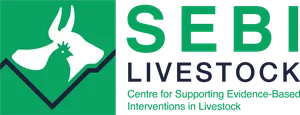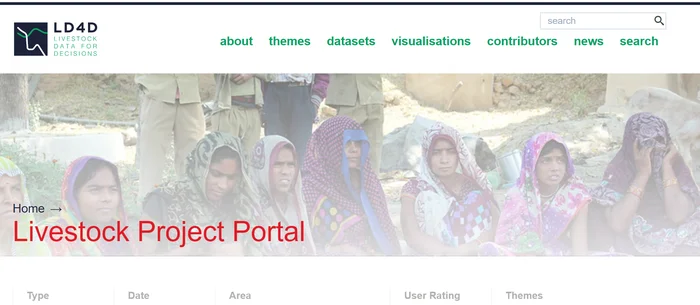Who is working on what, and where? An interactive map of livestock development activities

This post has been written by Vanessa Meadu, Communications and Knowledge Exchange Specialist for SEBI-Livestock, based at the University of Edinburgh. SEBI-Livestock facilitate LD4D - the Livestock Data for Decisions Community of Practice.
Dashboard maps projects from IATI data, for better coordination among livestock organisations.
Livestock project funders and implementers have basic but critical questions before they can decide on new investments or activities. Who is already working in an area? And what kind of livestock challenges are they addressing? Without this knowledge, projects risk repeating themselves, or competing. This can undermine efforts to improve food security and livelihoods in low-and middle-income countries. The Livestock Project Portal is a new tool that maps out the landscape of investments into livestock development, offering important evidence for organisations working in this space.

Visit Livestock Project Portal
The Livestock Project Portal taps into open data from the International Aid Transparency Initiative (IATI), to offer valuable “real time” insights on the activity of organisations working on livestock development. Users can explore who is working on what, where, and in some cases what data these projects are generating.
The Livestock Project Portal taps into open data from the International Aid Transparency Initiative (IATI), to offer valuable “real time” insights on the activity of organisations working on livestock development.
The portal is developed by SEBI-Livestock, the Centre for Supporting Evidence Based Interventions on Livestock, at the University of Edinburgh, in close collaboration with the Livestock Data for Decisions (LD4D) Community of practice. LD4D is a network of over 700 livestock data producers and users, working to improve data and analytics for better decisions.
Data-led insights for better decisions
Funders need a good understanding of the landscape of projects to ensure that investments improve upon existing activities and build on existing knowledge and community networks.
“The ability to map out ongoing or historic investments in a given geography or by species or subject matter hasn’t been possible, even within one funding organisation” said Shannon Mesenhowski, Program Officer of the Bill & Melinda Gates foundation, speaking at the recent LD4D community meeting.
A tool like this creates an opportunity for funders to connect on activities that may have similar objectives or goals
“At the moment, local organisations and local governments must try to reconcile the lack of coordination between funders rather than focusing on collective impacts,” she explained. “A tool like this creates an opportunity for funders to connect on activities that may have similar objectives or goals,” she said.
The dashboard has been designed with a range of users in mind, according to Louise Donnison, Senior Data Scientist at SEBI-Livestock. Donnison and her team have been engaging with LD4D community members to understand the needs of different user groups.
These groups include:
- Funders who wish to explore who is funding livestock projects at a global level with the aim of identifying funding gaps to allocate resources effectively
- Governments who wish to explore what investments are being implemented in their countries so that they can coordinate activities and resources
- Grantees in the start-up phase of their investment can find out who else is working on livestock projects in their target countries for advice on local contexts, or to find previous investments that may provide learnings before they start their new project
The foundation for the dashboard is IATI’s powerful Datastore API, which provides access to data published according to the IATI standard.
A pipeline built on open data
The foundation for the dashboard is IATI’s powerful Datastore API, which provides access to data published according to the IATI standard.
“We were able to write a python script that extracts livestock sector activities from the API, and creates clean data tables,” explains Alap Mehta, a data scientist at SEBI-Livestock who designed the data pipeline. These data tables are stored in a staging database, ready to be plugged in to the dashboard interface. “This data pipeline has been designed to be portable to other IATI domains such as fisheries,” says Mehta. In fact, a prototype fisheries portal is now live and ready for community feedback.
Wendy Thomas, IATI's Technical Lead said: "Earlier this year, IATI implemented Search Engine Optimisation (SEO) for the data in the IATI Datastore, enabling our data to be discovered via Google search. This has broadened the reach of IATI data, leading to our data being found by organisations such as SEBI, who did not know about IATI until they searched for livestock data and found our datasets."
Learning across communities
SEBI-Livestock are exploring opportunities for learning across the LD4D and IATI user communities. At the recent LD4D Community Meeting in September, IATI’s Sarah McDuff explained that LD4D members can test the quality and usability of IATI data and provide valuable insights on how data could be improved (watch meeting below). According to McDuff, the Livestock Project Portal represents an exciting use case which shows how IATI data can lead to impacts. The SEBI-Livestock team have also joined IATI discussions on ways to improve the dataset within existing infrastructure, like how to better use tags to curate data on cross-cutting themes.
Looking forward
We are still early in the journey, with the Livestock Project Portal in prototype mode. The SEBI-Livestock team will continue to engage with the donor community and other potential users, to refine and improve the tool so it can be used to guide decisions. We will also stay in touch with the IATI team to learn about new ways to extract insights from existing data. Together, we look forward to advancing data-driven solutions that can shape investments, and generate positive impacts for food security and livelihoods. If you have feedback, please get in touch at: [email protected]